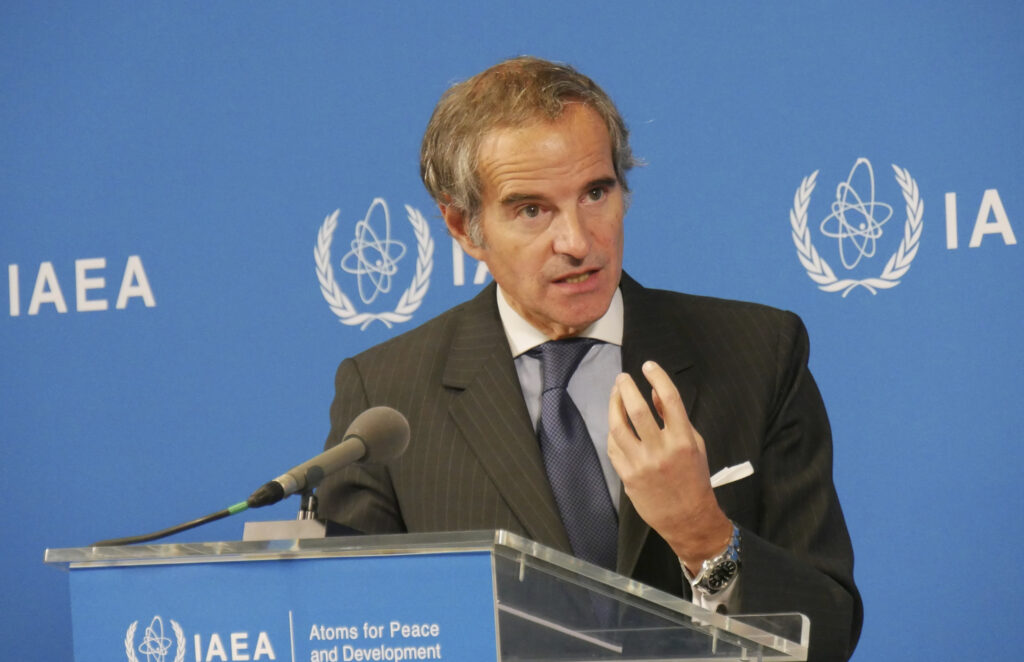The head of the United Nations’ nuclear watchdog warned Wednesday that Iran has not yet provided sufficient cooperation to international inspectors, even as European leaders appeared ready to reimpose sanctions on Tehran after last-minute diplomacy failed to resolve concerns about its nuclear program.
Despite Tehran’s decision to let inspectors back in for the first time since the 12-day Iran-Israel war in June, the International Atomic Energy Agency (IAEA) says the process of regaining full access to Iran’s nuclear facilities is far from complete.
“It is important that the inspectors are back,” IAEA Director General Rafael Grossi told The Associated Press in an interview. “At the same time, we still need to clarify a number of things, and we still need to address all the issues that are important in terms of the inspections that we have to carry out in Iran.”
Grossi described the renewed access as a breakthrough, though partial.
“This is important given that the attacks began in the aftermath” of U.S. and Israeli airstrikes on Iranian nuclear sites, he said. “There were many voices in Iran advocating the end of any cooperation with the agency, and there were voices in the world arguing that perhaps the IAEA would never go back and that we would lose this indispensable work that we carry out on behalf of the international community.”
For now, inspectors have returned only to the Bushehr nuclear power plant, not to other sensitive sites, including those hit by U.S. bunker-buster bombs earlier this year. Grossi said he has no immediate plans to visit Tehran — his last trip was earlier in 2025 — but remains in talks with Iranian officials about logistics for wider access.
Iranian Foreign Minister Abbas Araghchi confirmed inspectors were present at Bushehr this week to observe a fuel replacement, according to state-run IRNA. But he cautioned the development “didn’t represent a breakthrough” in granting IAEA entry to other facilities.
Iran maintains its nuclear program is peaceful, though it remains the only non-nuclear-armed nation enriching uranium to near weapons-grade levels. U.S. officials and the IAEA have long asserted that Iran operated a weapons program until 2003.
Grossi spoke to AP after meetings in Washington with senior U.S. officials, including Secretary of State Marco Rubio. According to the State Department, the two discussed “global nuclear safety and IAEA efforts to conduct monitoring and verification activities, including in Iran.”
European leaders from Germany, France and the United Kingdom — known as the E3 — have spent weeks in direct talks with Tehran but signaled they are prepared to invoke the “snapback mechanism” of the 2015 Iran nuclear deal. That step would restore U.N. sanctions on Iran over what they describe as Tehran’s ongoing noncompliance.
The U.S. and the E3 have set an Aug. 31 deadline for Iran to resume negotiations with Washington, allow full inspector access, and account for more than 400 kilograms of highly enriched uranium.
Deputy State Department spokesperson Tommy Pigott said Rubio spoke Wednesday with his European counterparts, and “all reiterated their commitment to ensuring that Iran never develops or obtains a nuclear weapon.”
Talks between Iranian officials and the Europeans in Switzerland this week “ended without a final outcome,” according to a diplomat briefed on the discussions. The diplomat requested anonymity because they were not authorized to speak publicly.
Iran’s deputy foreign minister for legal and international affairs, Kazem Gharibabadi, insisted Tehran “remains committed to diplomacy.” Writing on X, he said it was “high time” for the Europeans “to make the right choice, and give diplomacy time and space.”
Grossi’s high profile has made him a target. He confirmed he is under special protection by Austria’s elite Cobra police unit after receiving threats “from the direction” of Iran.
“It’s very regrettable that some people threaten the lives of international civil servants, the head of an international organization,” he told AP. “But we will continue our work.”
The Cobra force specializes in counterterrorism and high-risk security operations and typically protects Austrian leaders as well as U.S. and Israeli diplomats.
The Wall Street Journal first reported on the extra security measures for Grossi, an Argentine diplomat who has raised the IAEA’s global visibility with visits to Ukraine following Russia’s 2022 invasion and his work pressing Iran for access.
Israel’s strikes on Iran in June followed an IAEA censure — the first in 20 years — over Tehran’s lack of cooperation. Iranian leaders accused the agency, without providing evidence, of aiding Israel and the United States in planning the raids. Top officials and state media later called for Grossi to be arrested and tried if he returned to the country.
As the Aug. 31 deadline approaches, Grossi says the IAEA will continue pressing for access to all of Iran’s facilities, not just Bushehr. “We still need to address all the issues that are important,” he said, underscoring that cooperation remains “a work in progress.”
This article includes reporting by the Associated Press.
Read the full article here
